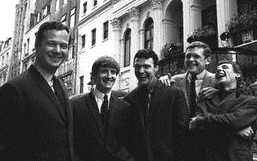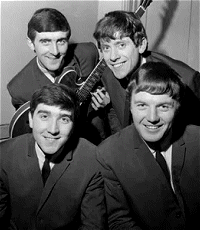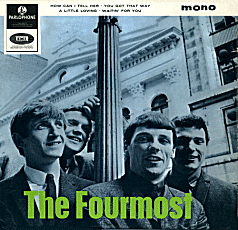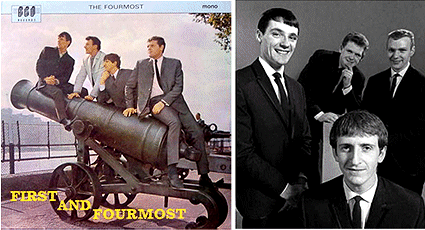Sixties
City presents
a wide-ranging series of
articles on all aspects of the Sixties, penned by the creator of the iconic
60s music paper Mersey
Beat
|
Sixties
City presents
a wide-ranging series of
articles on all aspects of the Sixties, penned by the creator of the iconic
60s music paper Mersey
Beat
|
|||||
|
 |
Brian
(Owie) O'Hara and Joey Bowers originally teamed up as The Two Jays at
the age of thirteen, performing for a season at the Isle of Man. They
were joined by Billy Hatton and Brian Redman and, in September 1959,
called themselves The Four Jays. Owie played lead, Billy was on bass,
Joey on guitar and Brian on drums. The three guitarists also vocalised.
The group had a rock/jazz/comedy act, but each member was pursuing a
career and initially decided to remain semi-pro. Joey turned down an
offer to join Jan Ralfini’s Band at the Locarno, Billy turned down the
opportunity of backing his friend Billy Fury, Owie the offer of joining
a television group and Brian a position with the Nat Allen Band.
As the Four Jays, they appeared regularly at the Cavern with The Beatles and were the special guests on a Beatles Fan Club night on Thursday 5th April 1962. By mid-1962 an argument resulted in Joey leaving the group and Mike Millward, former member of Bob Evans and The Five Shillings replaced him. Redman left the group for three months to play in Hamburg on the assurance that his position with the group was safe, but on his return Owie told him they’d decided to keep his replacement, Dave Lovelady. Later that year the group changed its name to The Four Mosts, having learned that a Southern group called the Four Jays was managed by London impresario Lou Prager. By the time Brian Epstein signed them on 30th June 1963, their line-up had settled at Mike Millward, Billy Hatton, Brian O’Hara and Dave Lovelady. According to Dave, they were the second group that Brian Epstein had approached with a view to managing them. He asked them to turn professional, but they turned him down, preferring to remain semi-professional. He made them a management offer three times and it was only after Gerry and The Pacemakers and Billy J. Kramer had their initial chart hits that they decided to sign with NEMS. Following his usual practice, Epstein placed them with George Martin, but they found they had no original material strong enough for them to record. Owie asked John Lennon if he had a number he could give them and John told him he had one that he’d written while sitting on the toilet. When they appeared with The Beatles at the Queen’s Theatre, Blackpool on 4th August 1963, John told them that the number they could have was called ‘Hello Little Girl’, which he’d penned in his teens and had included in the group’s repertoire since 1958. The Beatles had also recorded it at their Decca and Parlophone recording auditions. John was to say: “This was one of the first songs I ever finished. I was then about 18 and we gave it to The Fourmost. I think it was the first song of my own that I ever attempted to do with the group.” He also commented that it was loosely based on a couple of old standards which his mother used to sing to him when he was a small child and was an attempt to capture the mood of those songs written in the 1930s. Billy Hatton told Mersey Beat: “We arranged to go to John Lennon’s house, and they gave us a copy of the words. We hadn’t heard the number before, and George and John gave us a rough idea of it by taping the tune. We received the tape at 4 o’clock on Monday morning. As we had to record on the following Wednesday, we had two days in which to make an arrangement good enough to put on disc. As a matter of fact, when we were recording, we were just learning the song as we went along and were tremendously encouraged by A&R man George Martin”. ‘Hello Little Girl’ reached No. 9 in the British charts. Their next release was unusual in that it was a Lennon and McCartney number that The Beatles hadn’t used on an album and was written specifically for The Fourmost. |
|
The band continued appearing
in cabaret during the 1970s, but split in 1978. Three of the members – Joey
Bowers, Billy Hatton and Dave Lovelady – teamed up with Joey’s wife to form
a quartet called Clouds, which performed on a semi-pro basis in Liverpool
clubs until 1993. Owie found three other musicians and continued performing
for a time and then sold them the name The Fourmost for a reputed £1000.
He was said to have regretted it. The group then appearing as The Fourmost
had no association with the original hit makers and was locally referred
to, with typical Scouse humour, as the Fraudmost or the Four Almost. Where are they now? Mike Millward died of leukaemia in 1966. Billy Hatton still lives in Liverpool, is now retired and has completed his autobiography. Together with original members Joey and Dave, he occasionally performs as The Original Fourmost because a group who had no association with the hit band now owns their original name. Joey Bowers lives in Crosby, Merseyside, is now retired and, apart from appearances with the original Fourmost, occasionally plays bass with local bands, sometimes alongside his former band mate Dave Lovelady in Vince Earl’s group, in addition to various charity concert appearances. Dave Lovelady also lives in Crosby and is still an active drummer, playing in the Stevie Hodge Band, a country rock group, and also backs singer Vince Earl (Ron Dixon of ‘Brookside’), in addition to appearances with the original Fourmost. Brian O Hara, sadly, hung himself on 17th June 1999. The coroner reported that he had committed suicide due to depression over financial problems. Georgie Peckham has lived in London since the 1960s and ran his own successful studio, Porkys Prime Cut Studios, but has now retired. |
   |
|
Article
Text
UK
web hosting by
|